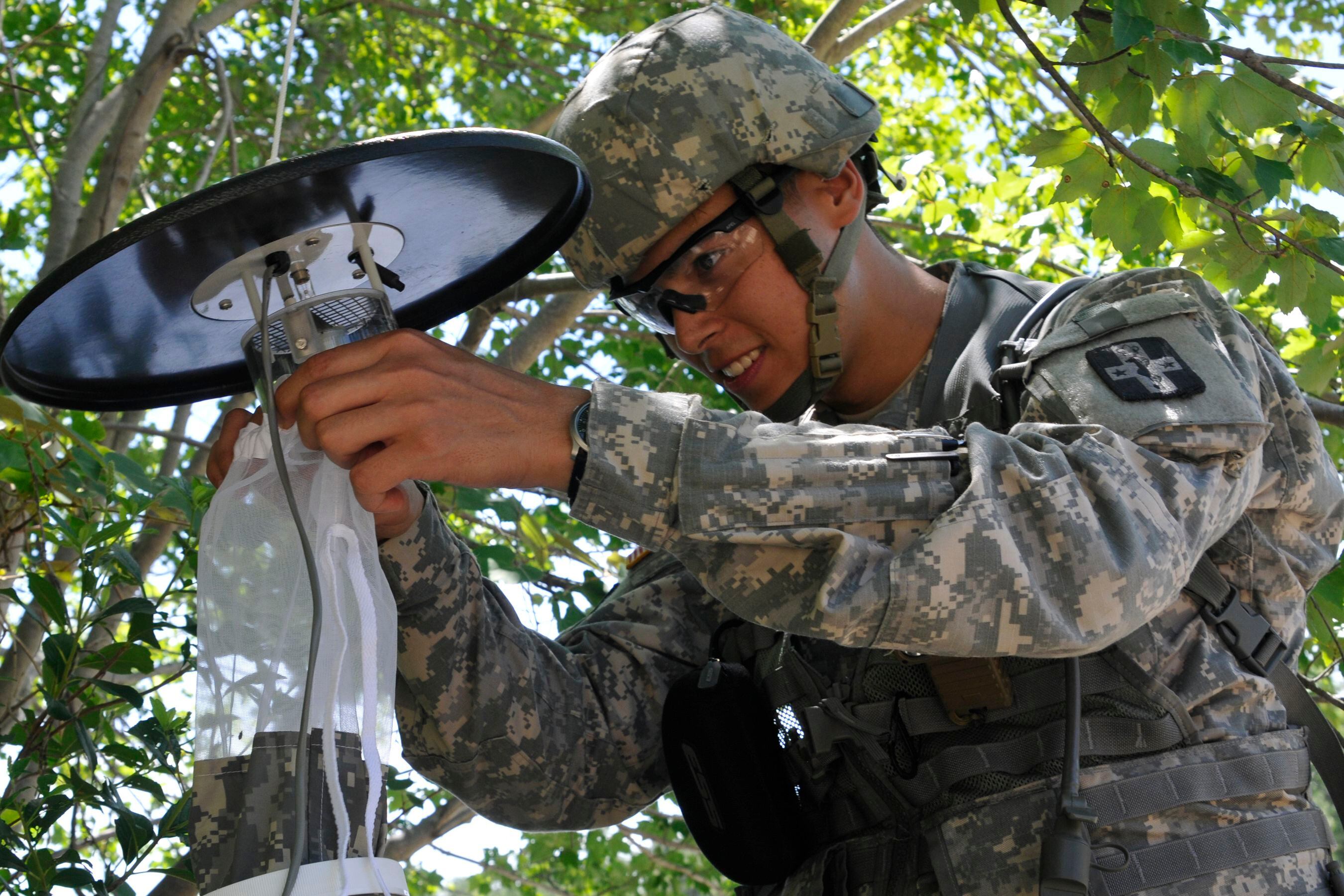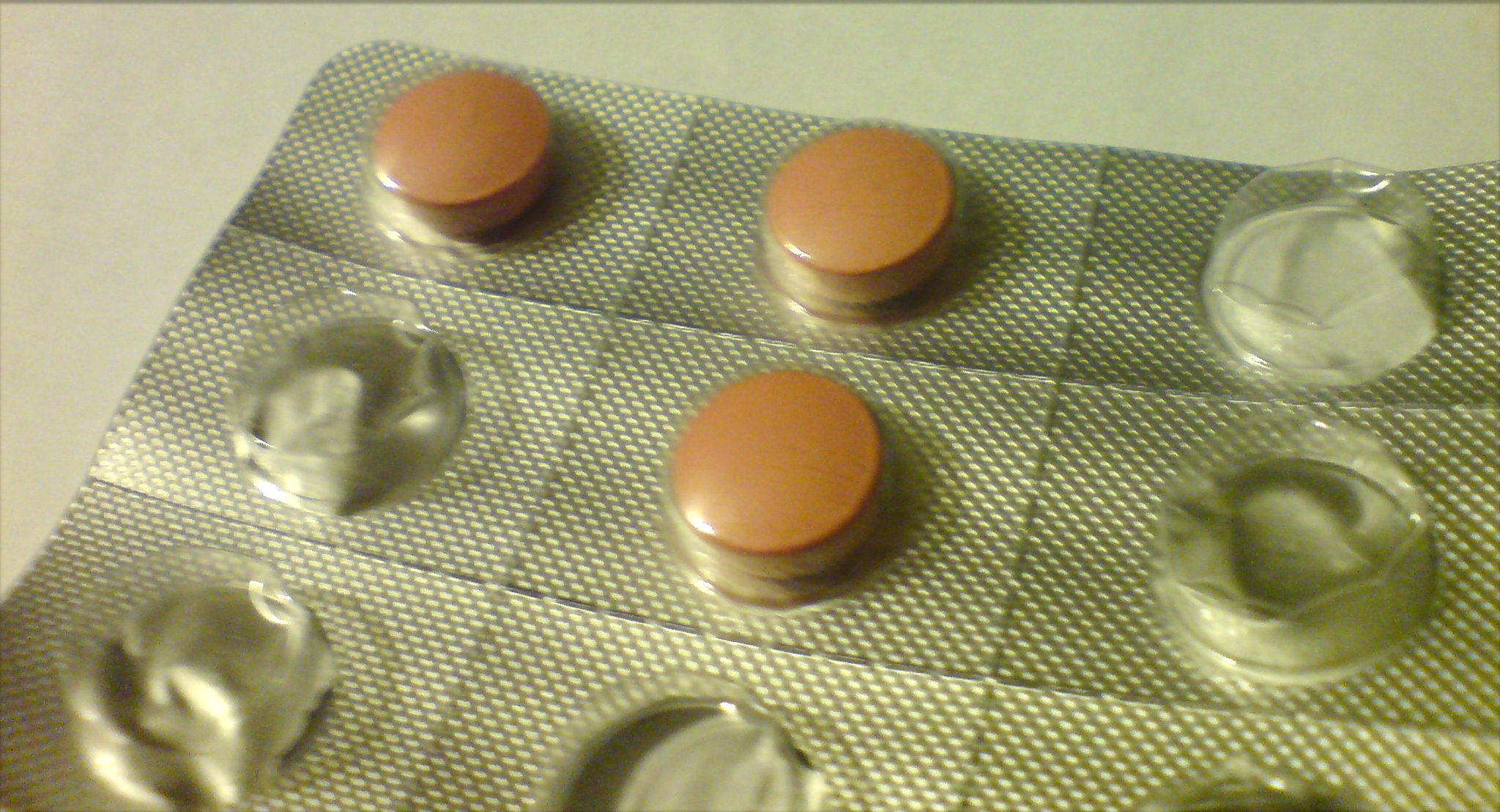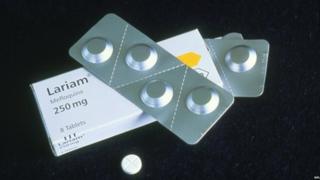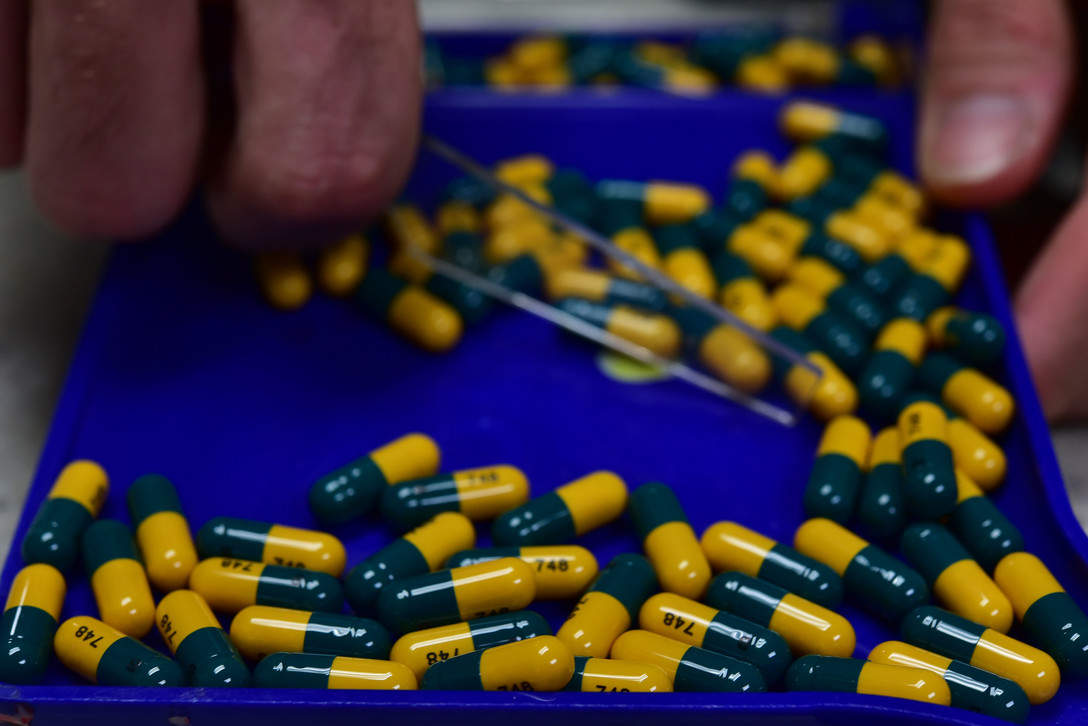Malaria Pills Military - The reasons are as personal as our members. Some join our 1,200 local branches for the fraternity. For some inspiring national events. Others for opportunities to serve fellow soldiers and their families. And many join to continue the fight to support the rights and interests of all veterans.
DAV understands the needs of veterans because we are veterans—we are 1 million strong. We invite you to join us in the action. 2018 VA Undersecretary for Aid Dr. In a letter to Paul R. Lawrence, Nevin suggested a simple solution to correcting these potential misdiagnoses: "It would be quick and easy to detect such a manifestation of symptoms during a clinical disability exam. The senior would ask, 'Have you taken Mefloquine,' and if that is, 'Did you have one or more of these symptoms while taking the drug?'
Malaria Pills Military
 Source: www.militarytimes.com
Source: www.militarytimes.com
In the 1970s, Walter Reed worked at the Army Research Institute in the United States. Developed by the military, mefloquine was introduced commercially in 1989 as a once-weekly drug to prevent malaria. It can also be used to treat mosquito-borne parasites. Shortly after the drug's release under the brand name Lariam, some users reported experiencing hallucinations, nightmares, psychosis, and fainting after taking the drug. The military knew the use of antimalarials and pesticides was important in combating the disease, but getting frontline troops to participate in these operations As a result, a third front of attack was opened in the form of anti-malarial propaganda. A comprehensive information campaign was launched to advise GIs to use mosquito nets to avoid situations where malaria mosquitoes are common, and to always take their ataprin.
Dav Is An Organization Of Veterans Helping Veterans
It wasn't the only tool he used to combat the spread of malaria in . The fact that no one can guarantee that all troops are regularly taking medication means that additional measures must be taken to reduce the risk of infection as much as possible.
One of the most important and effective tools the military had against malaria was the insecticide dichloro-diphenyl-trichloroethane, commonly known as DDT. From nuclear testing to Agent Orange and burning pits, the US military has decades of history.
However, there are some exposures that are deliberately introduced - with known risks - to military personnel as a matter of policy or as a clear requirement. This is true of the malaria drug mefloquine, which has been administered to hundreds of thousands of US soldiers despite the Pentagon and health professionals aware of its adverse effects.
"DOD dropped the ball while first administering mefloquine and did not record who and how many service members took it," said Shane Learman, deputy national legislative director for aids. “Recently, the VA contracted with the National Academy of Medicine to study the long-term health effects of antimalarial drugs. We believe this will overcome the shortcomings of the joint 2018 VA-DOD study and provide a way for Congress to establish a hypothetical service engagement with antimalarials like mefloquine. for any disease or disorder associated with the use of drugs."
 Source: armyranger.com
Source: armyranger.com
How The Medicines Work
He was admitted to have had significant problems during his US license. and anti-malarial medicine. "It was clearly known that some people would become psychotic and some very severe, but at the time it was not understood that these neuropsychiatric effects could cause permanent disability."
Malaria is a persistent disease that can have long-term effects on an infected person. American soldiers in the PTO faced two different types of illness: benign, which causes severe chills, fever, and malaise, and malignant, which is more likely to cause death.
Both types had the power to transform a combat-ready soldier into a bedridden hospital in a very short time. These cookies allow us to count visits and traffic sources so we can measure and improve our site's performance.
They help us know which pages are the most popular and least popular and see how visitors move around the site. All information these cookies collect is aggregated and therefore anonymous. If you do not allow these cookies, we cannot know when you visit our site and cannot monitor its performance.
Beginning in 1943, the military began using DDT in powder form, which was administered directly to soldiers and refugees in Italy, where the typhus epidemic was exacerbated. This treatment was found to be very effective against lice that spread the disease.
The same powder was used in the Pacific, but the military soon realized that DDT was also effective against malaria. WASHINGTON -- When Jimmy Corrigan joined the Navy three years ago, he was physically in the best shape of his life.
 Source: ichef.bbci.co.uk
Source: ichef.bbci.co.uk
Unable to walk without a cane today, he was hospitalized twice before becoming angry and suicidal. Additionally, there are signs of malaria control wherever the military has camped. These ranged from humorous to brutal. In one particularly gruesome case, the 363d Station Hospital in Port Moresby, New Guinea, hung a sign decorated with two human skulls that read, "These men did not take their ataprine."
While it's impossible to know what effect much of this campaign had, the importance of training troops in proper malaria control was taken very seriously by the military. II. The biggest challenge facing the military in the fight against malaria in the early days of World War II was ensuring the safe and reliable supply of essential anti-malarial drugs.
The traditional treatment for this disease is quinine, a medicine derived from the bark of the cinchona tree. Quinine is an effective antimalarial and has relatively few side effects that are mild in nature. As a result, it was the drug of choice used by the military to treat malaria.
The Armed Forces Radio Service (AFRS) has also helped fight malaria among veterans in the PTO. AFRS's "mosquito net" stations in the South Pacific constantly reminded soldiers to take their ataprin and often added humor to their broadcasts.
For example, the station in Guadalcanal hosted "The Adabrine Cocktail Hour", which airs daily at 5:30 PM and features fifteen minutes of "cocktail music" from "exotic" locations such as the "Fungus Festooned Fern Room." "High, starlit ceiling atop the Hotel de Gring in downtown Guadalcanal."
The disease is caused by a mosquito-borne parasitic protozoan that attacks the red blood cells and liver of an infected person. The wet, marshy areas found on many Pacific islands were excellent breeding grounds for the disease-carrying anopheline mosquitoes.
 Source: www.pharmaceutical-technology.com
Source: www.pharmaceutical-technology.com
In addition, the numerous shell craters, trenches, and pits created during combat operations all served to collect water, providing ample opportunities for insect reproduction and reproduction. When mosquitoes feed on an infected person, they become carriers of the parasite, and when they feed again, they release the disease into another person's bloodstream.
In this way, the incidence of infection can increase rapidly because each newly infected person can become a carrier, allowing more mosquitoes to contract the disease and infect additional victims, creating a vicious circle that is very difficult for the military.
discomfort. Four years later, the FDA issued its strongest warning about mefloquine, saying that the drug can cause persistent or persistent neurological and psychiatric conditions such as dizziness, loss of balance, tinnitus, anxiety, depression, paranoia, and hallucinations, even after you stop using it.
One of the forms the campaign took was a comic called "Malaria Mo," where he learned valuable lessons about reducing the risk of infection using military-provided equipment. It has been repeatedly stated in these comics that malaria incapacitates more soldiers than the Japanese.
In another attempt to draw attention to the GIs, a calendar of scantily clad women was produced. There are reminders for women to use insect repellent, not to swim after dark, and spray pesticides in their cabins.
"If you don't say anything about yourself, do it for him!" After the FDA warned that mefloquine's side effects could be permanent, the Army Special Forces banned all future use of the drug, making the Special Forces the only branch of the military to ban the drug.
![Fda Revokes Emergency Use Of Malaria Drugs For Covid-19 [Video]](https://s.yimg.com/uu/api/res/1.2/PC08ORcJSQRN2esbMsUfYA--~B/aD01NDA7dz05NjA7c209MTthcHBpZD15dGFjaHlvbg--/https://s.yimg.com/hd/cp-video-transcode/prod/2020-06/15/5ee7ef69b43fec78292906be/5ee7ef69b43fec78292906bf_o_U_v2.jpg) Source: s.yimg.com
Source: s.yimg.com
For all other commands and services this is the third option, but still recommended in the field. These cookies allow us to count visits and traffic sources so we can measure and improve our site's performance.
They help us know which pages are the most popular and least popular and see how visitors move around the site. All information these cookies collect is aggregated and therefore anonymous. If you do not allow these cookies, we cannot know when you visit our site and cannot monitor its performance.
But military records showed he continued to prescribe more than 18,000 mefloquine after CBS News' 2009 warning; this includes 1,200 doses for soldiers with mental health problems who should not take the drug. "பிரச்சினையின் மீதான நடவடிக்கையை தாமதப்படுத்த தாமதப்படுத்த ஆல் தவறான இந்த ஆய்வு மேற்கொள்ளப்படுகிறது என்று நான் நான் நான் நான் நான் நான் கவலைப்படுகிறேன். ஆம் ஆண்டின் முற்பகுதியில் நடந்தது. அந்த ஏப்ரலில் ஏப்ரலில், மருத்துவப் படையின் கர்னல் ஹோவர்ட். ஒருங்கிணைந்த ஆலோசனைக் குழுவுடன், ஸ்மித் மலேரியாவின் அலைகளைத் தடுப்பதற்குத் தேவையான கொள்கைகளை உருவாக்கி செயல்படுத் மகத்தான பணியைச் சமாளித்தார்.
ூலம் CDC.gov இல் நீங்கள் ஆர்வமாகக் காணும் பக்கங்கள் மற்றும் உள்ளடக்கத்தைப் பகிர குக்கீகள் உங்களுக்கு உதவுகின்றன. இந்த மூன்றாம் தரப்பினரால் இந்த குக்கீகள் விளம்பர நோக்கங்களுக்காகவும் பயன்படுத்தப்படலாம். மலேரியாவை தாக்குவதற்கு இராணுவத்திற்கு இருமுனை அணுகுமுறை தேவை என்பதை இராணுவ மருத்துவ அதிகாரிகள் விரைவில் உணர்ந்தனர். முதலில், நோய் வருவதைத் தடுக்க தேவையான மலேரியா எதிர்ப்பு மருந்துகள் மற்றும் கொசு எதிர்ப்பு சாதனங்கள் இராணுவப் படைகளுக்கு முறையாக வழங்கப்படுவதை உறுதி செய்ய வேண்டும்.
இரண்டாவதாக, வழங்கப்பட்ட மருந்து மற்றும் பிற பாதுகாப்பு நடவடிக்கைகளைப் பயன்படுத்துவதன் முக்கியத்துவம் குறித்து போர் மண்டலங்களில் உள்ள வீரர்களுக்குக அவர்கள் பரந்த அளவிலான் பிரச் பிரச் இருப்பினும், மலேரியாவுக்கு எதிரான போராட்டத்தில் இன்னும் பல சவால்கள் உள்ளன. ஒரு தேசிய. !!! கூடுதலாக, அட்டாப்ரைனை எடுத்துக் கொள்ளும்போது பல ஆபத்தான மற்றும் தனித்துவமான பக்க விளைவுகள் ஏற்படுவது கண்டறியப்பட்டது.
நோயாளியின் தோலை இயற்கைக்கு மாறான மஞ்சள் நிறமாக மாற்றும் துரதிர்ஷ்டவசமான போக்கு ஒன்று. இது தீங்கு விளைவிக்க வேண்டிய அவசியமில்லை என்றாலும், விளைவு தற்காலிகமானது மட்டுமே, பல வீரர்கள் தங்கள் மருந்தை கைவிடுவதற்கு இது போதுமான கவலையற்றதாக இருந்தது. இன்னும் மோசமானது, சில மிக அரிதான சந சந்தர்ப்பங்களில், அடாப்ரைன் நரம்பியல் பிரச்சினைகளை ஏற்படுத்தக்கூடும்.
 Source: quincy-network.s3.ca-central-1.amazonaws.com
Source: quincy-network.s3.ca-central-1.amazonaws.com
இது கனவுகள், அதிகரித்த பதட்டம் மற்றும் அரிதான சந்தர்ப்பங்களில், முழு மனநோய் வடிவத்தில் வெளிப்படலாம். அதிர்ஷ்டவசமாக, சிப்பாய்களுக்கு ஒரு பெரிய "ப்ரைமிங்" டோஸ் கொடுப்பதன் மூலம் இந்த பக்கவிளைவுகளை வெகுவாகக் குறைக்க முடியும் என்று விரைவில் கண்டுபிடிக்கப்பட்டது, அதைத் தொடர்ந்து தினசரி "பராமரிப்பு" டோஸ்கள். இந்த முறைக்கு நன்றி, போரின் போது அட்டாப்ரைன் கொடுக்கப்பட்ட GIகளில் பத்தில் ஒரு சதவீதத்தில் மனநோய் மட்டுமே காணப்பட்டது.
"இது உண்மையில் ஒரு மறைக்கப்பட்ட தொற்றுநோய், ஏனென்றால் சிலரே இந்த பிரச்சனைகளை காரணம் என்று கூறுகிறார்கள் கூறுகிறார்கள்-அவர்கள் வேறு ஏதோவொன்றைக் காட்டுகிறார்கள் காட்டுகிறார்கள், ஏனெனில் இது வரிசைப்படுத்தலின் போது எடுக்கப்பட்டது எடுக்கப்பட்டது எடுக்கப்பட்டது பல நடக்கின்றன மெஃப்ளோகுயின் போதையை PTSDக்கு தவறாகப் பகிர்ந்தளிக்கலாம். 1870 களில் உருவாக்கப்பட்டது, DDT இன் பூச்சிக்கொல்லி பண்புகள் 1939 வரை சுவிஸ் விஞ்ஞானி பால் முல்லரால் கண்டுபிடிக்கப்படவில்லை, அவர் தனது அலமாரிகளிலும் இழுப்பறைகளிலும் அந்துப்பூச் கலவையைத் தேடினார்லும் கலவையைத் தேடினார்.
DDT தெளிக்கப்பட்ட கொள்கலனைத் துடைத்தாலும், உள்ளே வைக்கப்பட்ட ஈக்கள் இறந்துவிடும் என்பதை அவர் கவனித்தபோது, அந்த இரசாயனத்தின் செயல்திறன் நிரூபிக்கப்பட்டது. 1942 ஆம் ஆண்டில், சுவிட்சர்லாந்தில் உள்ள ஒரு அமெரிக்க இராணுவ இணைப்பாளர் பூச திருப்பி அனுப்பினார் மற்றும் இராணுவம் உடனடியாக கவனித்தது. டிசம்பரில், ஒரு முன்னாள் கடற்படை சீல், லாரியம் தயாரிப்பாளரான ரோச் மீது, மருந்து அவரை நிரந்தரமாக ஊனமாக்கியது என்று குற்றம் சாட்டியது.
மருந்து நிறுவனம் கடுமையான பக்கவிளைவுகளை ஏற்படுத்தியது மற்றும் நோயாளிகளை எச்சரிக்கத் தவறியது என்று மருந்து நிறுவனத்திற்குத் தெரியும் என்று வழக்கு குற்றம் சாட்டியுள்ளது. அமெரிக்கன் ஜர்னல் ஆஃப் ட்ராபிகல் அண்ட் ஹைஜீன் ஹைஜீன் என்ற இதழில் இதழில் இதழில் ஆரோன் ஷ்னீடர்மேன் ஷ்னீடர்மேன் ஷ்னீடர்மேன் ஷ்னீடர்மேன் கட்டுரை சேவைகளின் இயக்குனர் இயக்குனர் இயக்குனர் கட்டுரை கட்டுரை கட்டுரை கட்டுரை கட்டுரை ஹைஜீன் ஹைஜீன் ஹைஜீன் ஹைஜீன் ஹைஜீன் ஹைஜீன் ஹைஜீன் ஹைஜீன் ஹைஜீன் ஹைஜீன் " போர் வெளிப்பாடு உட்பட மற்ற மாறிகள் கருதப்பட்டவுடன், "மெஃப்ளோகுயின் இடையே குறிப்பிடத்தக்க தொடர்புகள் எதுவும் இல்லை" மற்றும் ஐந்து ஆய்வு மனநல நிலைமைகள்.
இருப்பினும், சூழல் முக்கியமானது. S . "அதற்கு பதிலாக, இராணுவம் சொன்னது, 'இதோ உங்கள் மெஃப்ளோகுயின், நீங்கள் விமானத்தில் ஏறுகிறீர்கள சில பைத பைத பைத , குயினோலின் மருந்துகள் பற்றிய ஆராய்ச்சியை ஆதரிப்பதற்காக அர்ப்பணிக்கப்பட்ட குழு. "எனவே, தயாரிப்பு செருகலில் உள்ள முக்கியமான பாதுகாப்பு எச்சரிக்கைகளை நாங்கள் முறையாக புறக்கணித்து குறைமதிப்பிற்கு உட்படுத்தினோம்."
ஜப்பானியர்களுக்கு எதிராக போராடும் பசிபிக் தியேட்டர் ஆஃப் ஆபரேஷன்ஸில் (PTO) பணியாற்றும் சராசரி சிப்பாய் பல சவால்களையும் ஆபத்துகளையும் எதிர்கொண்டார். போரின் வரலாறுகளால் பெரும்பாலும் கவனிக்கப்படுவதில்லை, இவற்றில் மிகவும் நயவஞ்சகமான ஒன்று மலேரியா. இந்த நோய், பொதுவாக பாதிக்கப்பட்ட ராணுவ வீரருக்கு ஆபத்தானதாக இல்லாவிட்டாலும், அவர் போரில் காயமடைந்ததைப் போலவே, நீண்ட காலத்திற்கு அவரை நடவடிக்கையில் இருந்து வெளியேற்றும்.
மலேரியாவுக்கு எதிரான இராணுவத்தின் போராட்டம், ஜப்பானுக்கு எதிரான போரில் அமெரிக்காவின் வெற்றியை ஆபத்தில் வைத்திருக்கும் மனிதனுக்கு எதிராக இயற்கையின் ஒரு கண்கவர் கதை.